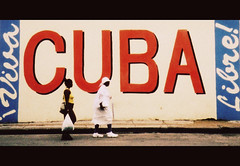By Paul Canning
Issues with relying on the US State Department for a accurate take on LGBT life in particular countries have been highlighted in
the reporting of Daniel Berhane, the self described 'leading blog in Ethiopia.
He has found a leaked Cable (
here's the cable) from US Embassy Addis Ababa, dated Dec. 30,2009. It claims that:
"A thriving LGBT social scene exists in Addis Ababa. Parties are generally unannounced and held in private homes or bars, with invitations distributed via word of mouth or text messaging….events are held at least on a weekly basis, with attendance of more than 50 people not unusual."
According to the Cable, citing Embassy ‘contacts’, such events have been forced to relocate, sometimes on short notice, because of real or perceived threats to the establishments where they are held. However it claims that no arrests or harassment have been reported linked to these social events.
The Cable notes that Ethiopia is a conservative society and homosexual conduct is punishable under Ethiopian law. It adds:
- Post [the Embassy] is not aware of any cases of homosexual conduct that have been prosecuted in recent years or any pending cases for homosexual acts between adults.
- In the past year, post received limited reports of violence against lesbian, gay, bisexual, and transgender (LGBT) individuals; however, reporting may have been scarce due to fears of retribution, discrimination, or stigmatization. The anecdotal reports post is aware of come from credible sources and include forced marriages and rapes of LGBT individuals.
- [social events of LGBTs] have been forced to relocate, sometimes on short notice, because of real or perceived threats to the establishments where they are held. However, no arrests or harassment have been reported linked to these social events.
- As in other countries, urban residents and young people are likely to be more tolerant of homosexual behavior when compared to their rural and elder counterparts, but even among this group conservative views dominate.
Not noted in State Department reports, but covered in
those of Rainbow Ethiopia LGBT/MSM, a group engaged in HIV/Aids prevention efforts, was the murder of an American diplomat Brian Daniel, 5 February 2009. He was found dead in his home in Addis Ababa, beaten to death with golf clubs in what the group says was a "homophobic attack". That aspect of the murder
appears to have been covered up.
The US State Departments
Human Rights Report on Ethiopia from the same period (2010) in the section on LGBT issues now required in these reports doesn't mention any "thriving LGBT social scene" but says the following:
There were some reports of violence against lesbian, gay, bisexual, and transgender individuals; however, reporting was limited due to fears of retribution, discrimination, or stigmatization.
The Cable and Human Rights Report also mentions
a December 2008 campaign by Ethiopian religious leaders called "United for Life". The Cable says this mainly involved the signing of a resolution by "dozens of religious leaders condemning homosexuality and urging the parliament to ban homosexuality in the Constitution. However, the Constitution was not amended to that effect, nor does it seem likely."
But Rainbow Ethiopia LGBT/MSM reported that the 'United for life' religious coalition was actually calling for the death penalty for gays.
They said that the local media was engaged in "open psychological homophobic war to agitate the general society" against LGBT.
"If these trends continue we may face more additional danger both from the government and the public. These will jeopardize the whole Ethiopians sexual minorities in general and our steering organization members in particular."
"At any time," the group wrote, "we may face public attack at any place, we don't have either a legal ground or organizational capacity to respond to this defamation, intimidation, harassment and attack because we are very resource constrained. So, we need a partner for capacity building assistance to our organization well functioning."
"Generally, to accomplish all the projects into fruition, we need the support of international humanitarians in the form of financial, technical, material."
In 2011, the group
is saying that:
[The government] show no interest to stop the massive death of the Ethiopian gays (Men having sex with men) by the epidemic of HIV/AIDS rather they threatened us to stop advocacy for those who are unnaturally engaged in sexual misconduct."
In September Behind the Mask's Melissa Wainaina
interviewed a gay Ethiopian based in Britain who runs the
Ethiolgbt.com website.
He said that: "The mere concept of the LGBTI community as a minority of any kind is non-existent in Ethiopia." Amharic dictionaries do not even include a word for 'gay' and:
"Systematic and divisive repression seems to have taken root planting immense fear among society at large. Civil societies are continually monitored and intimidated while almost every form of media government controlled. This does not allow for much of a human rights movement in Ethiopia."
The UN Human Rights Committee in its list of recommendations to Ethiopia last July, stated its opposition to criminalisation, adding that:
"The Committee’s concerns are not allayed by the information furnished by the State party that the provision in question is not applied in practice or by its statement that it is important to change mindsets before modifying the law in this regard."
It urged the government to:
"Send a clear message that it does not tolerate any form of harassment, discrimination or violence against persons based on their sexual orientation."































 Join our page
Join our page

